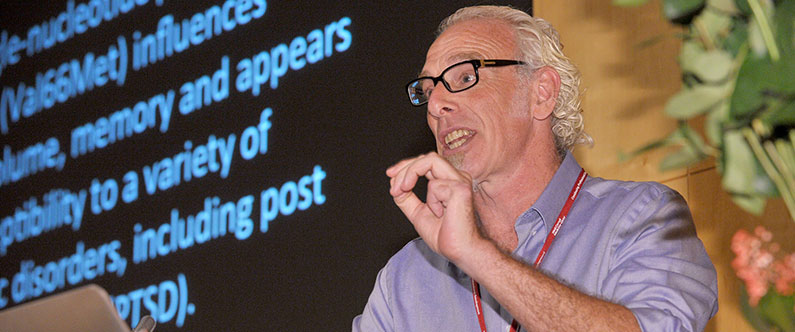WCM-Q Grand Rounds explores the healing power of the arts
 Dr. Rodney Sharkey explains how the arts and psychoanalysis can help people affected by PTSD.
Dr. Rodney Sharkey explains how the arts and psychoanalysis can help people affected by PTSD.
The capacity for the arts to enhance understanding of post-traumatic stress disorder (PTSD) was discussed in the latest installment WCM-Q’s medical lecture series, the Grand Rounds.
Dr. Rodney Sharkey, associate professor of English at WCM-Q, said that through the arts and storytelling, particularly in the context of the “talking cure” of classical 19th century psychoanalysis developed by Sigmund Freud, people affected by PTSD might be able to start to come to terms with their experiences and begin to heal.
“The idea of healing through stories in the context of highly advanced neurobiological studies of the very complex structures of the brain might seem somewhat unlikely,”
said Dr. Sharkey,
“but in fact, story is absolutely central to who we are and how we engage with our environment and society.
I propose that we can privilege story by resurrecting institutional interest in psychoanalysis and by recognizing the recurrence of trauma as a socio-political, environmental event.”
Although PTSD can affect anyone who experiences a traumatic event or long-term abuse, the condition is most frequently associated with soldiers. Speaking at WCM-Q to an audience of physicians, researchers, students and healthcare professionals, Dr. Sharkey said that in the US alone in 2012, 6,500 former military personnel took their own lives. In that year, 177 active-duty soldiers committed suicide - one more than the 176 US soldiers that were killed in combat in the same period.
Dr. Sharkey explained that soldiers often experience profound alienation and isolation when they return to civilian life as they struggle to relate to people who have not seen war and are unable to reconcile the ‘normality’ of peacetime with the violence they have witnessed and participated in. They often feel rejected by society and confused by the conflicting standards of morality that exist between the ‘normal’ world and the battlefield.
Much of the latest research into PTSD has focused on neurobiological changes to brain structures such as the amygdala and the hippocampus, which are involved in emotion, memory and motivation. Researchers have attempted to discover specific genetic traits that make some people more susceptible to PTSD and other anxiety disorders, and have even conceptualized a drug that could ‘turn off’ parts of the brain to effectively eradicate fear.
Some recent research, however, has acknowledged the limitations of a purely neurobiological approach to understanding PTSD, explained Dr. Sharkey.
He said:
“Ultimately neurobiology might not be able to identify the precise origin of the brain’s neuroplasticity; whether brain change occurs as a result of specific experience or as a naturally evolving organic process.
With PTSD, I think the key word is ‘trauma’. Rather than looking to find predispositions so that trauma can be prevented we should be directing research towards addressing the effects of trauma and ways of healing trauma as a collective event.”
The Grand Rounds, developed by WCM-Q’s Division of Continuing Professional Development (CPD), provides a platform for expert speakers to engage with healthcare professionals in the community to disseminate knowledge of the latest developments in medical technology, research and best practice.
Dr. Sheila Qureshi, senior lecturer in chemistry at WCM-Q, thanked Dr. Sharkey for his presentation.
She said:
“We are extremely grateful to Dr. Sharkey for his insights into this important and difficult issue. An appreciation for the arts helps physicians and medical students develop the critical thinking skills that are so crucial to the creative problem-solving processes underpinning the provision of quality healthcare.”